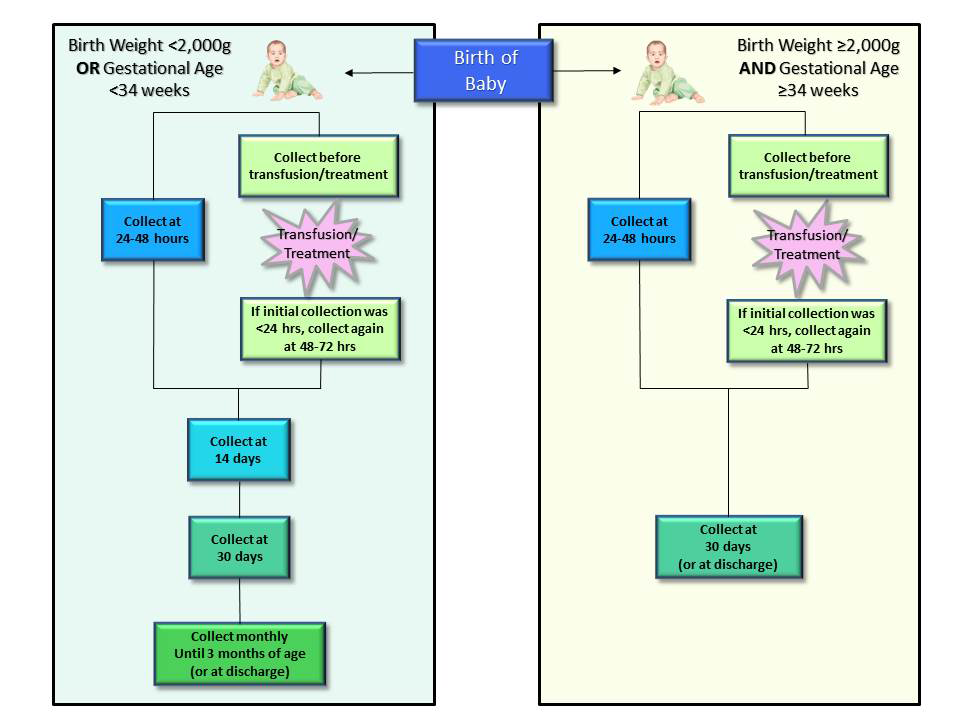When to Collect a Blood Specimen
Full-Term Infants (hospital / home / out-of-hospital births)
The Newborn Screening Statute applies to all births in Wisconsin. Due to the life-threatening consequences for some of the disorders, it is recommended that the specimen be collected between 24 and 48 hours of life. If the initial specimen was collected before 24 hours of life, obtain a repeat specimen at 48-72 hours of life.
Babies with Extended Hospital Stays

- Collect an initial specimen at 24-48 hours of life.
- Always collect an initial specimen before a transfusion or other treatment (except respiratory) occurs. If this specimen is collected prior to 24 hours of life, collect another specimen at 48-72 hours of life.
- For infants with a birth weight <2,000g, or with a gestational age <34 weeks, collect a second specimen (third specimen if infants initially tested at <24 hours of age) at 2 weeks of age, a third specimen (fourth specimen if infants initially tested at <24 hours of age) at 28-30 days of life or at discharge, whichever comes first, and then monthly thereafter, ending at three months of age or at discharge, whichever comes first.
- For infants with a birth weight ≥2,000g, and with a gestational age ≥34 weeks, collect a second specimen (third specimen if infants initially tested at <24 hours of age) at the time of discharge or at one month of age, if hospital stay is longer than one month.
NOTE: If any of the collections occur post-transfusion, follow re-testing guidelines stated on the laboratory reports. If screening results from any of the collections place infant at high risk for a condition, follow the recommendations stated on the reports.
NOTE: If discharge date is within 6 days of the last specimen collection, you do not need to collect another one at discharge.
Transfused Infants
Red blood cell transfusions, including extracorporeal life support (ECLS), can interfere with newborn screening test results. It is recommended to collect the initial newborn screen prior to transfusion.
- If the initial specimen was collected post-transfusion, collect a second newborn screen at 60 days of life (and greater than 14 days after last transfusion).
- If the initial specimen was collected before transfusion and less than 24 hours of life, collect a second specimen at 48-72 hours of life. The collection at 60 days of life is not needed, if the initial screen was performed prior to transfusion.
Babies Receiving Parenteral Nutrition
Total Parenteral Nutrition (TPN) is the administration of nutrients, intravenously, to reduce nutritional deficits and maximize growth. TPN contains amino acids, carnitine, and/or medium chain triglycerides that can interfere with newborn screening test results. It is recommended to collect the initial newborn screen prior to initiation of TPN.
- If the initial collection occurs before TPN AND at less than 24 hours of life, collect a second specimen at 48-72 hours.
- If TPN is administered before the collection, perform the first collection at 24-48 hours of life.
- Additional repeat screens may be needed. Please see report recommendations. These repeat specimens should be collected 4-24 hours after TPN has been discontinued.
Transferred Infants
It is recommended to collect the newborn screen at 24-48 hours of life. If transfer of the infant to a different medical center will occur prior to 24 hours of life, complete the NBS card and fill in the “Blood Not Screened” box. Be sure to inform the receiving hospital of collection status. The receiving hospital will assume responsibility for collection of the screen at the appropriate time frame (24-48 hours of life or prior to transfusion or TPN administration).
Parent Refusal of Newborn Screening Testing
Parents may refuse newborn screening testing of their baby ONLY “on the grounds that it conflicts with their religious tenets and practices or with their personal convictions.” If a parent refuses newborn screening, complete the NBS card, fill in the “Blood Not Screened” box and check “Refused.”